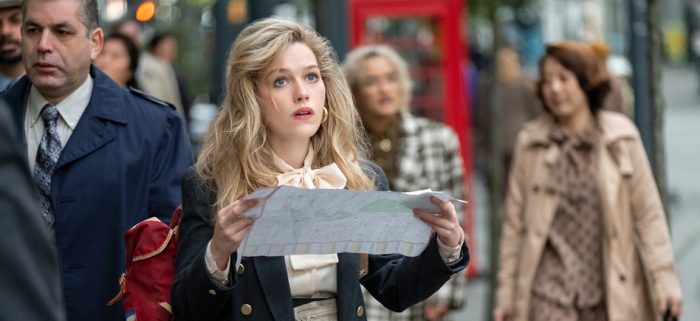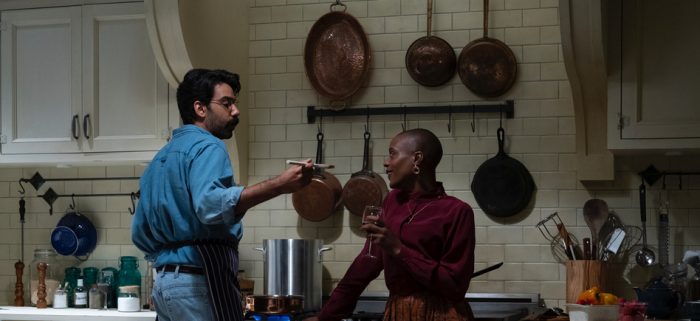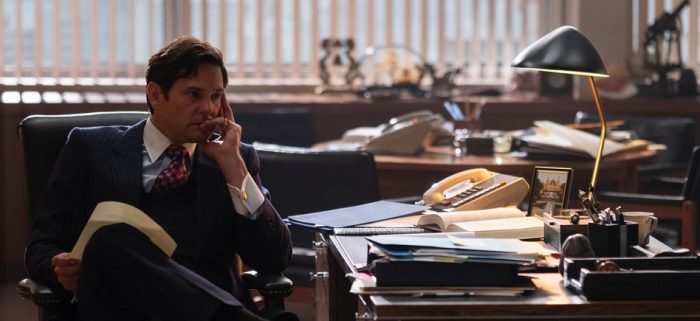'The Haunting Of Bly Manor' Spoiler Review: Not Perfectly Splendid – But Close
I've already given a traditional, spoiler-free assessment of The Haunting of Bly Manor, in which I delved into how the series felt like a bit of a step-down from The Haunting of Bly Manor. Part of that review abided by embargo notes – Netflix sent out a list of details they really didn't want covered in reviews, for the sake of protecting spoilers.
But now that Bly Manor has been streaming for a few days, I'm returning to touch on some of the more spoiler-centric elements haunting the new Netflix horror series.
What Happens in The Haunting of Bly Manor
Having firmly wrapped up the story in The Haunting of Hill House, Mike Flanagan and company decided to take an anthology approach to their Haunting series and tell a completely new story. Several of the Hill House cast members have returned – Victoria Pedretti, Oliver Jackson-Cohen, Henry Thomas, Kate Siegel, Carla Gugino – they're all playing new characters. And while Hill House stuck with Shirley Jackson's iconic tale of terror, The Haunting of Bly Manor adapts several different stories from Henry James – most notably The Turn of the Screw, which provides the framework for the season.
Things kick-off at a rehearsal dinner for a wedding where a mysterious woman (Carla Gugino) offers to tell a small gathering of people a ghost story. And hopefully, the listeners all have plenty of free time, because it's ultimately takes nine-hours to tell the whole thing. The story told jumps back to the 1980s, where we meet Dani (Victoria Pedretti), an American in the UK looking for work. After an incredibly awkward job interview with the wealthy, rather jerkish Henry Wingrave (Henry Thomas), Dani lands a gig as a nanny looking after Henry's orphaned niece and nephew – Flora (Amelie Bea Smith) and Miles (Benjamin Evan Ainsworth) – in the family's sprawling home, Bly Manor.
Dani isn't alone in caring for the kids at the house. There's also housekeeper Hannah Gross (T'Nia Miller), chef Owen (Rahul Kohli), and gardener Jamie (Amelia Eve), who just happens to have an accent that sounds very similar to the accent of the mysterious storyteller.
And oh yeah – Bly Manor is haunted.
Before Dani, the children were looked after by Rebecca Jessel (Tahirah Sharif), who drowned herself in the lake on the property. But her ghost is still sticking around, as is the ghost of Peter Quint (Oliver Jackson-Cohen), Rebecca's lover, and an employee of Henry. But there are other specters haunting the halls of Bly – far scarier creatures with featureless faces. And it seems Dani has brought a ghost of her own: a figure who is always seen wearing a pair of glowing round glasses.
Through flashbacks, we learn that this ghost is Edmund, Dani's childhood friend whom she grew up to become engaged to. But Dani has a secret: she's gay. Dani's pent-up sexuality boils over into a fight with Edmund that ends with Edmund is killed after being struck by a truck. Edmund's ghost has been haunting Dani ever since she was gifted with the dead man's glasses.
The guilt over Edmund's spills over into more conflicting feelings as Dani finds herself attracted to scrappy, no-nonsense gardener Jamie – and it becomes clear that Jamie has feelings for her as well. The two will eventually act on their attraction, but first Dani is able to free herself of Edmund's spirit by tossing his glasses into a fire. Unfortunately, that's just one ghost down and many more to go.
Flashbacks and twists prevail throughout the season. We learn that Hannah is also a ghost, although no one seems to realize it – not even her. The ghosts that haunt Bly are able to possess living people, and the ghost of Peter Quint possessed Miles and pushed poor Hannah down a well. Ghosts have a bad habit of bumping people off at Bly, because it was another ghost – the Lady of the Lake – who killed Peter. Through yet another flashback – this one jumping far back in time – we discover that the Lady of the Lake is Viola Willoughby (Kate Siegel), one of the original occupants of Bly and the root cause of all the hauntings going on in the house over the years. Viola's actions – spurned by her anger at coming down with consumption, which in turn caused her husband to grow romantically attached to her sister – have triggered a whole slew of deaths, with all those killed on the grounds stuck at Bly, forever cursed to haunt the grounds.
After his demise, Peter, in ghost form, possessed Rebecca, his lover, and forced her to drown herself so they could be together in the afterlife. Rebecca is, understandably, not very happy with this turn of events – but Peter has a solution. He and Hannah will possess Miles and Flora. They even manage to convince the kids to go along with the idea, but things are further complicated with Dani the mix. It all culminates in a big finale in which Dani is almost killed by Peter, and then almost killed again by the Lady in the Lake.
Henry shows up in the nick of time to help. Henry has his own problems – he's haunted by his own grinning, evil doppelganger, and he's also haunted by the fact that he had an affair with his sister-in-law (Alex Essoe), which resulted in the birth of Flora. Flora is unaware that Henry is secretly her father, but Henry wants to rectify that. Unfortunately, he gets killed by the Lady in the Lake. But don't worry – he gets to come back to life.
The same can't be said for all the other ghosts at Bly, however. But they can be set free – and they are, when Dani invites the Lady of the Lake to possess her in order to stop the ghost from drowning Flora. With the Lady in the Lake in her new host body, all the other ghosts – including Peter, Rebecca, and Hannah – are free to go...well, wherever it is ghosts go when they're not haunting big, spooky houses.
The children forget all about their trauma, and Dani and Jamie try to start a life together, with the Lady in the Lake lying dormant within Dani's body. For a while, Dani and Jamie have a happy life together – but it can't last forever. The Lady in the Lake starts to rouse from her slumber, and Dani is afraid she'll be forced to hurt Jamie as a result. Dani's solution: she goes back to Bly and drowns herself.
Back at the rehearsal dinner, all the pieces come together: the storyteller is an older Jamie, and the bride about to be married is Flora. And while Dani may be gone, Jamie keeps hoping to be with her again, because as the adult Flora says, this isn't a ghost story – it's a love story.
What Works
The Haunting of Hill House floored me. I was already a fan of Mike Flanagan, who directed that entire season, before watching, but I was still completely unprepared for how great the Netflix series would be. With that in mind, I was eagerly anticipating Bly Manor, which might have been a mistake. It is, perhaps, unfair to constantly compare Bly Manor to Hill House since they're technically different shows. But the connection between the two – similar actors, similar behind-the-scenes talent, similar scenario – makes that difficult. As a result, I spent this entire season feeling slight off-kilter. All the pieces were there to make Bly as good as Hill House. And yet...something was amiss.
But that's not to say there isn't plenty to enjoy, either. While Flanagan isn't behind-the-camera for the entire season this time (more on that below), Bly Manor fits in nicely with the filmmaker's emotional-driven approach to horror. And in many respects, the emotional elements of Bly Manor actually surpass Hill House. All of the romantic elements click, and it's interesting how they're contrasted.
There are three distinct different love stories here: the romance between Rebecca and Peter, which is passionate but doomed; the romance between Dani and Jamie, which is awkward but sweet; and, more tragically, the would-be romance between Hannah and Owen. The housekeeper and the cook clearly had feeling for each other, but they never got a chance to act on them. This is underscored in the final episode, where the dead Hannah flashes back to the moment she first met Owen. It's not the real Owen, of course – just her memory of him. But the two discuss the great romance they could have had, if only they had just professed their feelings for one another. If only.
T'Nia Miller is remarkable in the role of Hannah. She's able to make the character both stoic and melancholy, and these final moments, with Hannah finally confessing her love for Owen, are so powerful due to Miller's performance that they brought tears to my eyes. And I'm not talking a single tear rolling down my cheek here, gang. I'm talking copious amounts of tears.
Miller is backed-up by a strong cast across the board. I'll say there's not a wrong performance in the bunch, although some of the accents – I'm looking at you, Henry Thomas and Carla Gugino – are a bit touch and go. Standouts include Oliver Jackson-Cohen, who has the market cornered at playing sexy-yet-evil guys at this point; and child actors Amelie Bea Smith and Benjamin Evan Ainsworth, who are both precocious and twee without it becoming annoying.
But the real standout here is Victoria Pedretti. What a find Pedretti is – virtually unknown before Hill House, Pedretti has fast become one of those performers worth watching in anything, no matter what the role. Here, Pedretti's Dani is the glue that keeps Bly Manor together, and it's a tricky role. Dani is full of conflicts, forever betting herself up for the death of Edmund and for her own sexual orientation. She's afraid to give voice to it, and when she and Jamie finally kiss, it causes even more conflict. Pedretti nails all of this perfectly, playing Dani as a fidgety, awkward, slightly neurotic bundle of nerves – constantly fidgeting with her words, and her hands. This type of acting could tip into gimmicky in the wrong hands, but Pedretti knows exactly how to play it so that Dani feels like a real person, not just a character.
Which makes the ending almost unbearably heartbreaking. Some may take issue with Dani's demise – is it yet another case of the unfortunate Bury Your Gays trope? – but in the context of the story, it works. That doesn't make it any less tragic, though, and there's an oppressive melancholy that settles over the final moments of Bly Manor.
As much as I loved Hill House, I'll contend that the final episode tipped into schmaltzy territory, and I wasn't very happy with how they altered Shirley Jackson's famous "whatever walked there, walked alone" line into the cringeworthy "those who walk there, walk together." Bly Manor, in sharp contrast, is the complete opposite. While the episodes that come before its finale aren't as good as Hill House, it sticks the landing perfectly, closing the story on a far-less-positive note. Yes, the show gives us a sweet final image of Dani's ghostly hand on Jamie's shoulder as she sleeps. But Dani is still gone – just as Hannah is gone, and Rebecca, all the other unfortunate souls lost at Bly. With its final moments, The Haunting of Bly Manor is reminding us that life is fleeting. That none of us really gets a happy ending. We only get happy moments. Some of those moments may stretch on for years – decades, even. But eventually, they will end, our bodies will return to the dust, and our spirits will go off to wherever it is spirits go – assuming they go anywhere. It's an ending tailor-made to emotionally destroy you, and it works oh so well that I can only respect it while also comically blowing my nose after weeping so damn much.
What Doesn't
The Haunting of Bly Manor has a serious pacing problem. Over the course of its nine episodes, I never grew tired of The Haunting of Hill House. I was never in a hurry for the story to wrap itself up. As far as I was concerned, Hill House could stretch on as long as it wanted to. I can't say the same for Bly, which jumps around in time so much that it begins to grow tedious.
Shifting timelines is a Mike Flanagan staple – he did it notably in Occulus, and Bly Manor cuts back and forth between past and present as well. But Bly's digressions into the past all feel like filler. The fact of the matter is that while I was invested in the story of every member of the Crane family in Hill House, I was indifferent to most of the supporting players of Bly. The episode focusing on Henry's doppelganger is perhaps the worst offender here. Henry Thomas' performance is fine, but watching the actor bicker with himself for almost a full hour stops the show's momentum in its tracks.
Bly Manor is primarily pulling inspiration from Turn of the Screw, but that story – and its several film adaptations, most notably The Innocents – is a story of seclusion. The nanny in that story is alone with the children and Mrs. Gross in the big, sprawling estate – which makes things all the more disturbing when she starts spotting ghostly figures. In Bly Manor, however, Dani is constantly surrounded by people. It robs the show of its potential for horror, and saps away some of the story's strength. It's hard for us to be so concerned for Dani when she's forever in the company of other adults and not just mischievous children who may or may not be playing mind games with her.
I can't help but think that ultimately, Bly Manor would've worked better as a film rather than a series. There's such great material here, and it's frequently getting lost in the shuffle. Even a shorter season – say 6 episodes instead of 9 – could've helped things out. Did we really need an entire flashback episode to show us where the Lady in the Lake came from? I've seen some people trying to compare that episode – episode 8, "The Romance of Certain Old Clothes" – to Hill House's game-changing sixth episode "Two Storms," and that comparison isn't warranted at all. Sure, it's neat that "The Romance of Certain Old Clothes" is in black and white, but...so what?
TV, like film, is a collaborative art, and it takes many people working behind-the-scenes to make things happen. But Hill House had the benefit of having Mike Flanagan behind the camera for every episode. With Bly, Flanagan only directs the premiere. And while the directors working this season – Yolanda Ramke & Ben Howling (Cargo), Ciarán Foy (Sinister 2), Liam Gavin (A Dark Song), E. L. Katz (Channel Zero), and Axelle Carolyn (Tales of Halloween) – all do good work here, I still yearned for one authoritative voice guiding the narrative. Had Flanagan – or even another filmmaker on the list – helmed all the episodes this season, the full narrative might feel less jumbled and more guided.
The pros seem to far outweigh the cons in Bly Manor, but it's hard to shake of the disappointment. Perhaps if I had been able to completely divorce myself from memories of Hill House I'd be more won over by Bly's charms. But different story or not, Bly clearly inhabits the same galaxy as Hill House, and separating the two is easier said than done. I hope Flanagan's experiment continues into a third season – lord knows there are plenty of ghost stories to adapt. But I also hope that next time more of that Hill House magic returns. That would be perfectly splendid.



